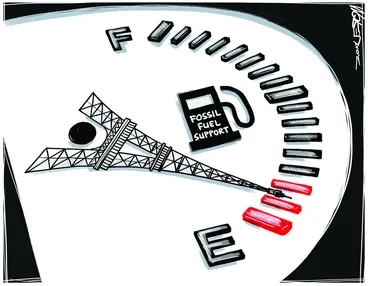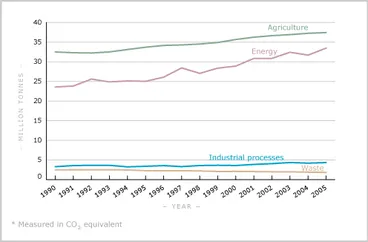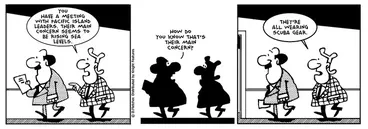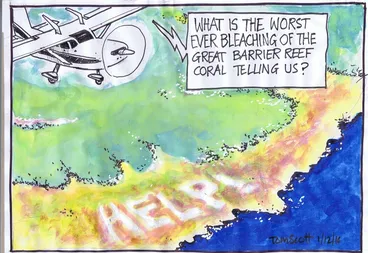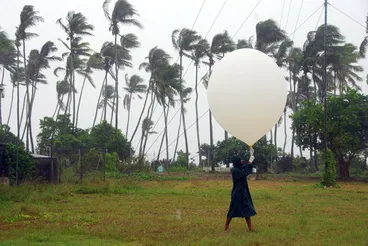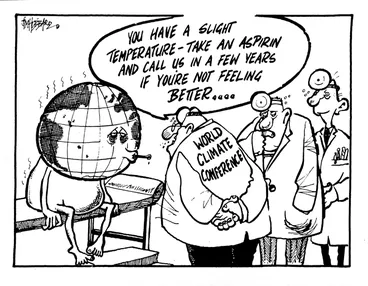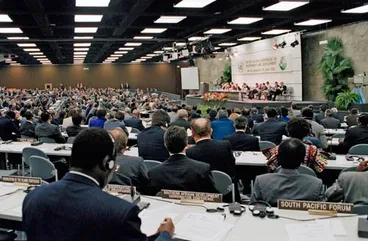The Impact of Climate Change in the Pacific
A DigitalNZ Story by National Library Services to Schools
Rising sea levels and disappearing islands are proof that climate change is a huge threat to Pacific nations. This story is about the causes of climate change, its impact and what is being done to combat it in the Pacific Islands.
Climate change, Pacific Islands, Cook Islands, Fiji, Samoa, Niue, Tokelau, Tonga, Tuvalu, Kiribati
BACKGROUND
It’s a well-documented fact that climate change is happening, and nowhere is this more evident than in the island nations of the Pacific. These islands are being swamped by a rising ocean, raising issues around loss of livelihood, land culture and Pacific Islanders becoming environmental refugees.
Rising sea levels are irreversible in the short-term which leads to questions about what can be done to help the hugely impacted Pacific Island nations.
WHAT IS CLIMATE CHANGE?
The climate is the average weather over a long period of time. The climate depends on how much radiation (heat) reaches the earth from the sun, and how much radiation is given off by the earth. Normally this is roughly equal, and allows life on earth to exist. Anything that upsets this balance will cause temperatures to change.
Source: Climate change, Te Ara - the Encyclopedia of New Zealand, (accessed 3 March 2020)
CONTENTS
This story on ‘The impact of climate change in the Pacific’ covers the following:
- What is climate change?
- Causes of climate change
- Climate change in the Pacific
- Call for action
- Fast facts
- Glossary
- Supoorting resources
CAUSES OF CLIMATE CHANGE
Greenhouse gases are released during manufacturing, farming and other activities carried out by people. The gases form a layer that traps the radiation given off by earth and keeps it in the atmosphere like warm air in a greenhouse. This causes the planet to warm up. If it gets warmer, more ice will melt into the oceans and low-lying countries will be flooded by the rising sea level. This is one of the biggest issues to do with the future climate.
Source: Climate change, Te Ara - the Encyclopedia of New Zealand, (accessed 3 March 2020)
Greenhouse gas emissions by sector
Manatū Taonga, the Ministry for Culture and Heritage
CLIMATE CHANGE IN THE PACIFIC ISLANDS
Climate change across the Pacific causes:
- rising sea levels, flooding, coastline erosion, the salinity of drinking water and crop destruction
- an increase in the number of tropical storms and cyclones that cause widespread damage
- an increase in the number of climate change refugees
- coral to bleach and die threatening reef ecosystems
- irregular rainfall resulting in floods or droughts which impacts on island self-sufficiency.
Sea level rise worse in Pacific than other regions
Radio New Zealand
"What is the worst ever bleaching of the Great Barrier Reef coral telling us?"
Alexander Turnbull Library
Devastating coral bleaching around French Polynesia
Radio New Zealand
Study warns of climate migrants from Pacific
Radio New Zealand
Pacific climate change bringing more flooding
Radio New Zealand
Climate observation, Kiribati
Manatū Taonga, the Ministry for Culture and Heritage
CALL FOR ACTION
In 1988, international concern about global warming led to the establishment of the Intergovernmental Panel on Climate Change (IPCC). This group was to assess all the latest scientific, technical and socio-economic research on the topic. The IPCC’s Third Assessment Report in 2001 identified sufficient evidence to blame global warming on human activities. Scientists had carried out extensive modelling to understand the global climate, but were unable to reproduce the warming observed since 1950 without increasing carbon dioxide concentrations.
Source: Climate change - Global warming, Te Ara - the Encyclopedia of New Zealand, (accessed 6 March 2020)
Pacific leaders call for climate action
Radio New Zealand
All Pacific countries urged to help climate refugees
Radio New Zealand
Pacific Climate Change Fund launched
Radio New Zealand
Extreme weather in Pacific linked to climate change
Radio New Zealand
Quitting Kyoto Protocol seen as threat to Pacific
Radio New Zealand
QUICK FACTS
- The Marshall Islands is planning to build a five-kilometre seawall on the coast of its Majuro Atoll as a buffer against rising sea levels and high waves during storms.
- Tokelau is now entirely solar-powered as it strives to adapt to changing conditions.
- The Carteret Islands near Bougainville were the first islands in the world to require population relocations due to rising sea level rises. Currently, the highest point on the islands is 1.5 metres above sea level.
- In 2019, Prime Minister Jacinda Ardern announced $150 million to support climate change resilience in the Pacific islands.
- Kiribati gets its water from 'water lenses' which lies under atolls. This is freshwater which is less dense and floats on top of denser saltwater in the form of a convex shape. These water lenses are being threatened by rising sea levels.
- Ciguatera poisoning is a kind of food poisoning caused by eating fish that have been poisoned by bleached coral, due to rising water temperatures.
World Climate Conference
Manatū Taonga, the Ministry for Culture and Heritage
GLOSSARY
Definitions below have been taken from the Oxford Learner's Dictionary.
intergovernmental - involving the governments of two or more countries.
irreversible -that cannot be changed back to what it was before.
modelling -the work of making a simple description of a system or a process that can be used to explain it, etc.
self-sufficiency -the ability to do or produce everything that you need without the help of other people.
socio-economic - relating to society and economics
SUPPORTING RESOURCES
Across the sea — Ihaka and his sister discover the impact of climate change when they visit whānau on a distant island.
Climate change — a range of videos on the impact of climate change on the islands in the Pacific.
Climate change — A commitment by the Australian Museum to raise awareness about climate change and how it is impacting the people and the environment.
Climate change and disaster risk management — Framework for Resilient Development in the Pacific on a regional strategy for an integrated approach to climate change.
Climate change impacts more than sea level rise — Impact of climate change on food, security, health, infrastructure, planning and budgeting.
Climate change in the Pacific — reducing the vulnerability of islands coasts.
Climate change research aims to give back Pacific’s ‘sustainable voice’ — Dr Jessica Paisis gives voice to 12 Niuean women and their first-hand experiences climate change.
How does climate change affect migration in the Pacific? — Some of the latest scientific knowledge generated on the theme by UNU Institute for Environment and Human Security (UNU-EHS).
Safe as houses: The impact of climate change on coastal houses around the world.
Solar power in Tokelau — A family in Tokelau explains why they have switched from using fossil fuels to renewable energy sources and the impacts of climate change.
Supporting the mental health needs of Pacific climate change migrants — New Zealand explores how its health system can support the mental health needs of Pacific climate change migrants.
Tuvalu - Islands on the forefront of climate change — Photography on how Tuvaluan people will become environmental refugees.
UN landmark case for people displaced by climate change — Amnesty International rules that governments need to be more considerate when deporting climate change refugees.
What is the Kyoto Protocol? — What it means for counties who have signed up and their responsibilities regarding the emission of greenhouse gasses.
Radical solutions to climate change needed - Kiribati
Radio New Zealand
Pacific Islands Forum: Security, climate change top of agenda
Radio New Zealand
Climate-change conference
Manatū Taonga, the Ministry for Culture and Heritage
This story was curated and compiled by Te Puna Mātauranga o Aotearoa | National Library of New Zealand, Services to Schools staff, March 2020.
